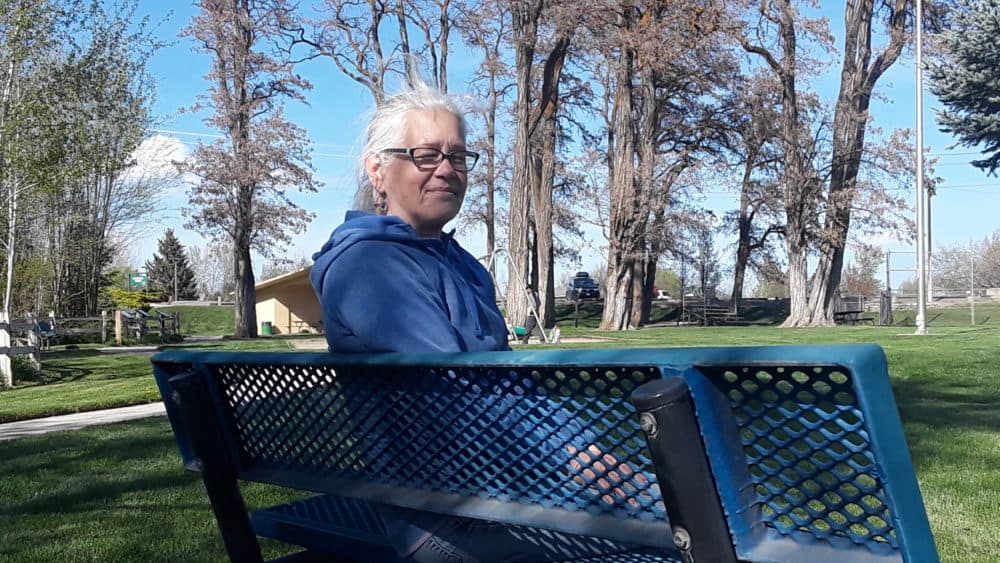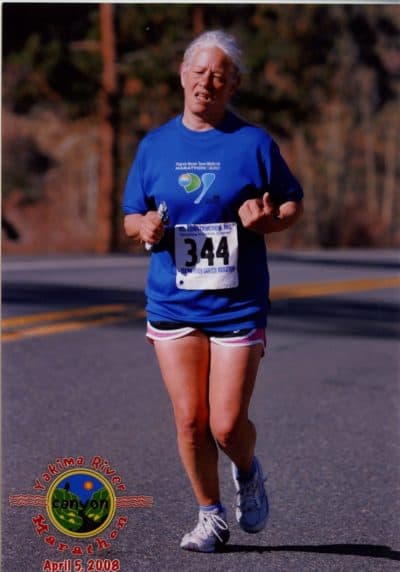Advertisement
While Homeless, Leigh Ann Harris Found Strength In Running

Leigh Ann Harris says she’s always been an anxious person. She got divorced when she was in her early 30s — and that made things worse.
"My sense of self and worth was very, very, very damaged," Leigh Ann says.
When she was in her late 40s, she read that daily exercise could help. So she started walking.
"Either before work or after work, I would go out and I would just walk around the block and I would time it," Leigh Ann says. "I was doing 30 minutes a day — of just walking, that was it."
On one of those days, her teenage daughter came along, and they walked around a high school track together.
"She said, 'I dare you to run around the track,' " Leigh Ann says. "And I said, 'Yeah, right.' And she said, 'Seriously! Run around it! See if you can do it!' 'All right, I’ll try.' So I started jogging, huffing and puffing, but I did make it around the loop. After that, I got it in my head to start jogging a little bit here and there.
"What running did for me was give me self-confidence and a much higher sense of worth and value. So I got over feeling like I wasn’t good enough as a woman."
Maui Marathon
By late 2003 — about a year after she started running — Leigh Ann could run for almost an hour without stopping.
"I was wanting to do longer than that," Leigh Ann says. "I thought, 'Well, you know, I don’t know what’s involved with doing a marathon, but I can check into it.' I had not done a 5K. I had not done a 10K. I don’t think it had registered with me that I should start out with something smaller. Honestly, it just never occurred to me."
Leigh Ann signed up for the 2004 Maui Marathon. After training through Seattle’s mild summer, she headed to Hawaii in the early fall. The day of her race, temperatures were in the 80s, with humidity over 60%.
"I started getting close to the mile marker 18," Leigh Ann says. "My legs would no longer hold me up. I was holding onto the mile post and I literally started to faint."
Someone called 911, and an ambulance picked her up and brought her to a hospital to be treated for dehydration and heat stroke. But she says, if anything, that experience made her more determined to finish a marathon.
Advertisement
"When I set my mind on something, I dig in my heels and I don’t quit until I’ve done it," Leigh Ann says.
"When I set my mind on something, I dig in my heels, and I don’t quit until I’ve done it."
— Leigh Ann Harris
So Leigh Ann trained for and ran Seattle’s Seafair Marathon the following summer.
"Crossing that finish line was like being god — being on top of the world and looking down at everything else," Leigh Ann says. "My first thought was, 'OK, when’s the next one?' "
Hard Times
Leigh Ann set a goal of running seven marathons. She says she picked that number because Lance Armstrong had won the Tour de France seven times.
But things weren’t going well in her life. She was living in an apartment, but she only made $1,000 a month working part-time. She couldn’t pay the rent. She ended up moving into a rooming house.
Leigh Ann says she got a new job canvassing for the Sierra Club, but she lost that. She couldn’t find another job. This was 2005, and the economy was starting to slow down. No one was hiring.
Leigh Ann’s savings were rapidly disappearing. And then the city of Seattle found that the rooming house where she was living wasn’t up to code. Everyone was evicted. Leigh Ann had no job and almost no money. She ended up in a shelter in downtown Seattle.
"It was in a basement — like a huge warehouse basement," Leigh Ann says. "And there were 40 women crammed in. And there was no fresh air. There were no windows. The ceiling was black. They dimmed the lights at night. They did not turn them out. And the attendants were required to walk through. I’m a very light sleeper. I couldn’t sleep for five nights straight when I first got in there."
Leigh Ann says the hardest part was her lack of control.
"As an independent woman, who’d been taking care of two kids all her life, that was a real insult to me," Leigh Ann says. "Not being allowed to make my own decisions about when to get up, when to go to bed, what I could eat, what I couldn’t eat. You really have to give up a lot of your independence to be part of the shelter system."
Through it all, Leigh Ann kept running.
"The running made me feel in control again," Leigh Ann says. "It made me feel reconnected to the real me. The people that I passed were normal, everyday, average people. And if I conversed with them, it was as an everyday, average, normal human being. They had no idea what circumstance I was in. It helped me to connect with society in a healthy way."
It wasn’t easy to keep up her training. For one thing, she didn’t have enough food. She was living on food stamps, about $5 a day, and the food offered in the shelter made her sick.
"And so I would try to find some bread or something like that to eat," Leigh Ann says. "I often went to bed hungry — lost a very great deal of weight.
"I often went to bed hungry — lost a very great deal of weight."
— Leigh Ann Harris
Leigh Ann would wake up before anyone else in the shelter and put everything she’d need for the day in her backpack. Then she’d take a bus to wherever she wanted to run that day, hide her backpack and run.
That’s how it worked until one day, when she went to Seattle’s Queen Anne neighborhood for a run.
"I looked around and didn't see any real bushes that I could hide the pack behind," Leigh Ann says. "So I set it just on the ground in a flowerbed. I had done that before and it had been OK. This particular time, I came back and the backpack was gone."
A week later, someone at the Hygiene Center, a place where homeless people can do their laundry and take a shower, gave Leigh Ann a new backpack.
After that, she started leaving her backpack at the Seattle Running Company, a running store not too far from her shelter.
"I just said, you know, 'I don’t have a car. I’m here to run. Can I leave my backpack here?' " Leigh Ann says.
Dropping by the Seattle Running Company three times a week gave Leigh Ann something else, too: a running community.
"Boy, those were the days," Leigh Ann remembers. "I really enjoyed listening to them talk. It's very, very, very motivating because they share not just the accomplishment, but what they have suffered in the doing of it. And it helps you. 'OK, he did that. I can do this.' And that was one of the reasons why I was so focused on the seven marathons and continuing with the running is because I was part of that mindset, too, where you set a goal and you do it or you know you don't give up."
Capital City Marathon
So Leigh Ann decided not to wait until she had a job and a home to run another marathon. In May 2006, she packed some blankets in her backpack and rode the Greyhound bus down to Olympia, about an hour south of Seattle, the night before the Capital City Marathon.
"Slept on the steps of one of the government buildings and got up in the morning and changed and stowed all my gear with — under the table — and I say, 'I’ve got a lot of stuff here. Is this going to be OK?' And they said, 'Yeah, it’s going to be OK.' ”

When Leigh Ann crossed the finish line that day in five hours and two minutes, she said to herself...
“ 'OK, I’m going to be OK for a while now,' ” Leigh Ann recalls. "You know, and that really helped a lot."
"Did you feel like you were going to be OK because you had done something powerful and strong?" I ask.
"Very much so. Very much so," Leigh Ann says.
Leigh Ann went on to run two more marathons while homeless. She says she took the feeling that finishing those races gave her and she used it to get back on her feet in another way.
"Because I had set the goals that I did and was meeting them, that perhaps I could finish a two-year degree," Leigh Ann says. "And it was when I was at Highline Community College, finishing my two-year degree, that I decided to see if I could go for a four-year degree."
Leigh Ann transferred to Central Washington University, which is about 100 miles east of Seattle, in the city of Ellensburg. She got a student loan so she could move out of the shelter into a dorm and then eventually into her own apartment.
She finished college, with a degree in music and a minor in exercise science. She’s still living in Ellensburg, not far from where she went to college, in low-income housing.
She can’t run these days because of arthritis in her hips. She misses it.
"There's something about being in the fresh air, the pounding on the pavement, the repetition of the pavement, the exertion that your body is going through — it makes you feel better," Leigh Ann says.
Before she had to give up the sport, Leigh Ann Harris ran the 2010 Seattle marathon. It was her seventh marathon finish.
We first read about Leigh Ann's story in a Seattle Times piece.
This segment aired on June 1, 2019.